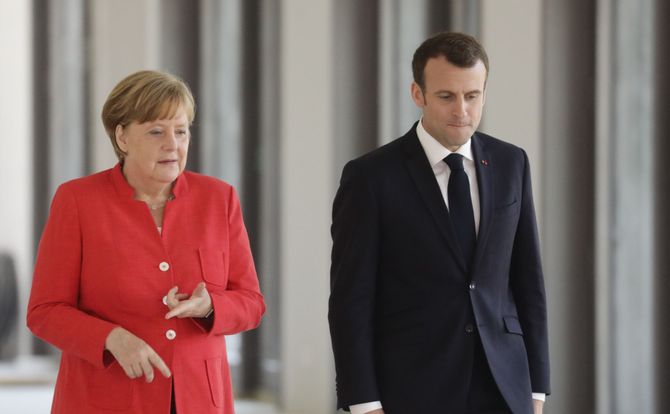The fragile German-French axis heads toward isolation
Germany and France want to lead the European Union, but their leaders, Chancellor Angela Merkel and President Emmanuel Macron, have adopted policies that endanger the bloc. Calls for greater centralization will alienate other member states, while hypocritical criticism of the U.S. and Russia will leave the Union isolated.

In a nutshell
- The leaders of France and Germany are pushing policies that are isolating Europe and threatening the cohesion of the EU
The leaders of Germany and France, Chancellor Angela Merkel and President Emmanuel Macron, are visiting Washington, D.C. this week. Both espouse a policy that Germany and France should lead Europe together. President Macron plays the role of the charismatic, visionary statesman. Chancellor Merkel heads a weak coalition governing Europe’s economic powerhouse.
Although the two leaders are politically and philosophically close, their countries want to go down different paths. Both agree on criticism of the Trump administration. A common point of such criticism is now Washington’s new protectionism and preference for bilateral relations rather than multilateralism. However, it is ignored that the European Union itself is more protectionist than President Donald Trump’s United States. Let’s not forget that the Transatlantic Trade and Investment Partnership (TTIP) was already bound to fail before the U.S. elections, due to European “worries.”
The leaders agree on a reform of the EU, and Chancellor Merkel signed a coalition agreement with Germany’s Social Democratic Party that contained calls for a more centralized and harmonized Europe, even if it results in a multi-speed construct.
Arrogant criticism
This is also the policy of European Commission President Jean-Claude Juncker. At the same time, these leaders criticize democratic governments in the Union as illiberal and authoritarian, especially those in Central Europe. Between the lines, they suggest that people in these countries elect such governments because they are not mature enough for democracy, a stance some leading European media are also taking toward the U.S. The criticism of these countries by the French and German leaders reminds us of former U.S. Defense Secretary Donald Rumsfeld’s then misplaced (in the European view) distinction between Old and New Europe.
Both leaders are also very critical of Russia, and advocate a strong regime of sanctions.
However, opinions and economic necessities do not necessarily support the axis between Chancellor Merkel and President Macron. This became obvious at their last meeting, when Ms. Merkel had to deviate from a common policy due to economic and political realities at home. There was large concern that a more centralized Union with a common Ministry of Economy and Finance would result in a transfer union with a continuation of high deficit spending. Germans find this unacceptable.
Germany and France both pretend to be ‘liberal democracies.’ The system, however, has little to do anymore with classical liberalism.
Germany and France both pretend to be “liberal democracies.” The system, however, has little to do anymore with classical liberalism. Timothy Less explains this well in his essay, “The dawn of post-liberalism”: Classical liberalism “believes in free markets and competition as the optimal means of promoting growth. It seeks to minimize the role of the state, which exists mainly to uphold the rules of the market. And it supports the unrestricted movement of goods, capital and workers across international borders.” Contemporary liberalism, on the other hand, “is a complex amalgam of rationalism, cosmopolitanism, social democracy, Marxism and bureaucratic authoritarianism.”
Dangers of centralization
We see here a transformation of a decentralized democracy to a centralized bureaucracy. Centralization already laid the groundwork that led to Brexit. Bashing Central Europe as “immature” and “illiberal” will further estrange it from the EU.
German policies of, on one hand, favoring harsh on sanctions on Russia, and on the other, refusing to invest enough in defense, is inconsistent at least. Sanctions combined with an insufficient deterrent do not work. Angela Merkel and Emmanuel Macron are highly critical of the U.S., but fully dependent on American protection through NATO. They are critical of Russia, but are becoming increasingly dependent on Russian gas.
Undoubtedly, Germany and France together form an essential part needed for a strong and competitive Europe. This axis, however, is resulting in strained relations with the U.S. and Russia. It will also damage the cohesion of the bloc through too much centralization, the ever closer Union, and the moral arrogance of the “liberals.” Brexit has already become fact.
